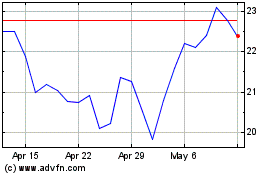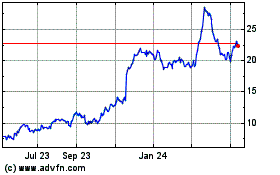Athletic-Gear Makers Run Into a Problem: Their Workout Clothing Is Too Sporty
05 April 2016 - 4:50AM
Dow Jones News
By Sara Germano
At a time when workout gear is fashionable, companies that make
and sell sportswear are facing a strange predicament: their gear is
too sporty for some.
Karyn Riale, chief buyer for high-end gym chain Equinox, has
stopped carrying traditional brands such as Adidas at the shops in
its locations. Instead, Ms. Riale said she prefers to make room for
what she calls lifestyle brands like Michi, which makes
mesh-paneled leggings called "Psyloque" and "Suprastelle."
Foot Locker Inc. also is adjusting the selection at its stores
after noticing that upstart brands with higher style quotients such
as Alala and Koral are performing well, and activewear endorsed by
celebrities, including Rihanna, is driving sales.
"We believe we have overemphasized the performance aspect of
what our customers want in terms of athletically inspired apparel,"
Chief Executive Dick Johnson said in late February. Shoppers are
"very, very informed about style," and want to look good "going out
after class for a juice or coffee," he noted.
As a result, some mainstay sports brands and retailers are
rethinking the balance between performance and fashion. The success
of women-centric athletic companies such as Lululemon Athletica
Inc. and Gap Inc.'s Athleta have paved the way for hundreds of
brands to jump on the athleisure bandwagon, according to NPD Group
sports industry analyst Matt Powell. As of last year, Mr. Powell
said there were more than 800 brands competing and no single one
has the lion's share of the market yet.
Last Thursday, pop star Beyoncé launched a line of athletic
clothes of her owned called Ivy Park that will be available at
retailers, including Nordstrom and Topshop, later this month.
While the overall sales of women's athletic apparel are growing
at a fast clip of 19%, according to NPD Group, there are signs that
the retail market for women's performance gear is slowing.
According to SportsOneSource, which tracks traditional sportswear
retailers and other national chains, sales of women's performance
apparel are flat so far this year, after 3% growth last year.
"There is a lot more competition now. There are a number of new
brands," said Neil Schwartz, vice president of business development
for SportsOneSource. Its data don't capture international sales or
direct-to-consumer sales, which have been a growing piece of
business for Nike Inc. and others.
The big three performance brands -- Nike, Under Armour Inc. and
Adidas AG -- which started out targeting men with high-performance
materials, are turning their attention to the women's market, which
they see fueling growth in the years to come. Under Armour recently
hired new executives to lead its women's apparel and footwear
divisions. CEO Kevin Plank in January forecast its women's business
to eventually outsell its men's business.
Nike forecasts sales of women's products will roughly double by
2020, though its share of total sales will remain about the same.
In its last fiscal year, women's gear accounted for 22% of Nike
brand's $25.8 billion sales.
Its approach to women's gear remains performance oriented. In a
statement, Nike said it begins its product design process by
addressing technical needs for athletes, but "performance-inspired
design doesn't mean sacrificing style, as how you look and feel are
integral to how you play."
Meanwhile, Adidas' recently hired head of its women's segment,
Nicole Vollebregt, is exploring new retail options, including
getting its gear back in some of the shops at Equinox's gyms. The
German sportswear company has brought in former Lululemon CEO
Christine Day to help advise on retail strategy and collaborations
with smaller brands in the women's business.
Its Reebok brand has teamed up with New York-based graffiti
artist Upendo Taylor to make exclusive products for New York-based
Bandier, a two-year-old boutique with locations in New York and
Dallas.
National sportswear retail chains are struggling to get the
model right for women's stores.
Foot Locker is paring back its Lady Foot Locker outlets to make
way for a new model of bigger stores called Six:02. Dick's Sporting
Goods Inc. has put expansion plans of its new Chelsea Collective
boutiques on hold after it had to alter the merchandise in its
initial two locations, according to a person familiar with the
matter. The boutiques have been "helpful" in learning more about
consumer tastes, Chief Executive Ed Stack recently said.
The moves seek to appeal to shoppers like Chelsea Lee, a
magazine designer who works out at hip-hop dance classes at studios
around Manhattan at least three times a week, who want more style
in their gear. Ms. Lee said she frequently buys new sports bras but
avoids pure-sports brands like Under Armour because they lacked the
fashion factor.
"It sounds silly to say that they look so athletic, because I'm
doing something athletic," Ms. Lee said, "but it doesn't look cool
enough to me."
Write to Sara Germano at sara.germano@wsj.com
(END) Dow Jones Newswires
April 04, 2016 14:35 ET (18:35 GMT)
Copyright (c) 2016 Dow Jones & Company, Inc.
Gap (NYSE:GPS)
Historical Stock Chart
From Jun 2024 to Jul 2024

Gap (NYSE:GPS)
Historical Stock Chart
From Jul 2023 to Jul 2024
